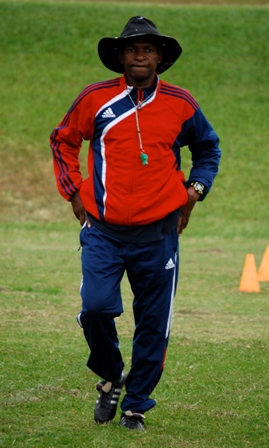
African football has lost a giant. Reggie Shelembe (1960-2010), former player for African Wanderers, Durban Bush Bucks and AmaZulu and coach of Maritzburg City, has passed away from cancer. My heartfelt condolences to his family.
I got to know Reggie at the Izichwe development program where he coached young boys and my daughter. Reggie was a football connoisseur, devoted family man and teacher who came to training despite his illness, always eager to discuss the young players’ progress, the latest Champions League match and, of course, the 2010 World Cup. One hot afternoon, too hot for his weary body, he watched the training session from his parked car. When I went to say hi he smiled broadly and said: ‘man, you’ve got a nice first touch! I could see it all the way from here!’
I only had the privilege of Reggie’s company for a cruelly short time. But I’ll remember fondly our many afternoons spent ‘doing football’. His knowledge, generosity and commitment will continue to inspire us to put people before profits in and out of football.
Thabo Dladla’s thoughts on the passing of his dear friend tell us far more than I ever could. Here they are:
Mhlanga Madondo, one of our most promising young coaches, made a profound statement when the late Reggie Shelembe was critically ill. ‘We cannot afford to lose a man of his experience. Reggie’s death will put uMgungundlovu [Pietermaritzburg] football back more than 20 years. It will be very difficult for local to recover from his passing.” Zakes Gwala, SAFA KZN secretary, also made a telling statement about Shelembe a few years ago. ‘The man spends most of his time training players, whether it’s a cold or very hot day.’
I think it is proper to thank his family to have allowed football to share him. We live in a time where life is more about status and power. There are very few men and women who are prepared to make sacrifices for others. A lot of people coach hoping to get instant fame and fortune. We have few people in this country with the passion to work under difficult conditions.
Shelembe lived for football. He would call me at odd hours to talk about technical-tactical ideas. He was a true student of the game. The last time I visited him, he was watching the recent Women’s U20 World Cup. He was excited about the growth of women’s football. Shelembe was also part of the coaching group that recruited Izichwe Youth Football Programme talent. He worked with Styles Mkhize and Mhlanga Madondo in the infancy stage of the programme. He came to training even when he was sick. He trained juniors in the mornings and seniors in the afternoons.
The death of Shelembe should usher in a new commitment from people. Football needs parents who will take responsibility for the development of children. I would like to appeal to young players to learn from Shelembe’s life. It is important to give back in life. May his family be consoled by the fact that Shelembe lived life to its fullest. He was a brave man who fought hard to the end. May his soul rest in peace. Unzima lo mthwalo!